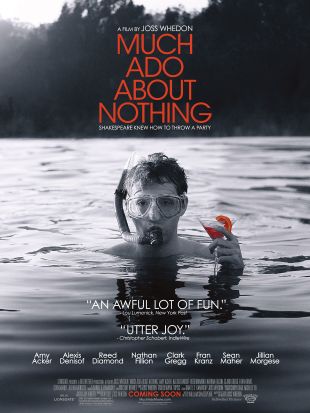
Some artists survive in Hollywood by following a "one for them/one for me" approach. It's hard to think of a more perfect example of this than Joss Whedon going from the grand bombast of The Avengers to a low-budget, black-and-white take on Much Ado About Nothing. The real surprise, however, is that Whedon brings as much of his heart and soul to William Shakespeare's characters as he does to Stan Lee and Jack Kirby's.
One of the Bard's most admired comedies, Much Ado focuses primarily on the relationship between Beatrice (Amy Acker) and Benedick (Alexis Denisof), two equally witty and seemingly cynical members of court who take every opportunity to verbally needle each other, but are eventually tricked into declaring their deeply felt affection. Their story plays out alongside that of Claudio (Fran Kranz) and Hero (Jillian Morgese), a young couple whose impending nuptials are the reason people have gathered at a palatial estate.
However, Don John (Sean Maher) is attempting to mess with everyone's plans by spreading rumors about the bride-to-be, and his henchmen just might pull off this nefarious scheme unless a seemingly dense officer named Dogberry (Nathan Fillion) can piece together what the would-be saboteurs have plotted.
Whedon has been holding readings and stagings of various Shakespeare productions at his home for years, and this project is a direct outgrowth of those exercises. It has the charm of something homemade and cared for, so much so that it could be dismissed as a trifle if it weren't for the fact that the actors are uniformly superb. Denisof and Acker not only spar like a classic screwball couple, they make Shakespeare's dialogue -- which Whedon keeps even while setting the movie in modern times -- sound as natural as the characters on Buffy.

Fans of the Whedonverse will have a fun time picking out the cameos by many of the writer/director's stable of actors, but his longtime collaborator Nathan Fillion gets the plum role of Dogberry, one of the funniest characters in all of literature, and turns in the best film work of his career. His gentle handsomeness helps sell Dogberry's apparent buffoonery, and with his uncanny comic timing, he lands some of Shakespeare's silliest and most appealing verbal jokes. He gives the kind of performance that gets an actor a lot of work.
The box office for Whedon's quickie labor of love will be lucky to match a tenth of a percent of Iron Man and company's one-and-a-half-billion-dollar worldwide haul, but for those who enjoyed that superhero blockbuster for the banter and ensemble acting more than the Hulk smashing and hammer throwing, this Much Ado deserves and rewards your time.
